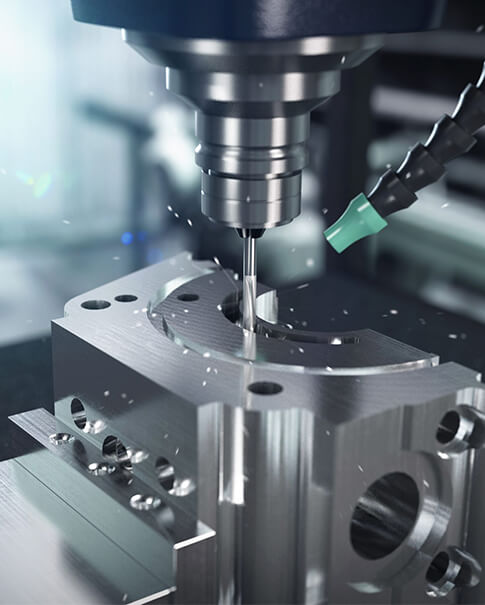
Introduction
In the pursuit of micron-level accuracy and operational efficiency, GT-PROTO is pioneering the integration of artificial intelligence (AI) and machine learning (ML) into CNC machining. By leveraging smart manufacturing technologies, we achieve tolerances as tight as ±0.005mm while reducing waste, downtime, and costs. This article explores how our AI-driven systems are transforming CNC processes—from predictive maintenance to adaptive toolpath optimization—and why this matters for industries demanding uncompromising precision.
Keywords: AI-driven machining, Predictive maintenance, Adaptive control, Tool wear monitoring
A. Real-Time Process Optimization
Traditional CNC machining relies on static toolpaths and manual adjustments. GT-PROTO’s AI-powered systems dynamically adapt to variables like material hardness, tool wear, and thermal drift:
Adaptive Feed Control: Adjusts cutting speeds based on real-time sensor data (vibration, temperature, acoustic emissions).
Toolpath Correction: Compensates for tool deflection in thin-walled parts, reducing scrap rates by up to 30%.
Case Study:
A client required 500 aerospace brackets from Inconel 718. Our AI system detected tool wear 15% earlier than scheduled, auto-adjusting feeds and avoiding a 12-hour downtime. Result: 0.005mm tolerances maintained across all parts.
B. Predictive Maintenance
Unplanned downtime costs manufacturers up to $260/hour. GT-PROTO’s ML models analyze machine data to predict failures before they occur:
Vibration Analysis: Identifies bearing wear in spindle motors with 95% accuracy.
Lubrication Alerts: Recommends optimal intervals based on usage patterns.
Keywords: Micro machining, Tool path optimization, Surface finish control, CAD/CAM integration
A. Micro-Tool Management
Machining features smaller than 0.1mm (e.g., medical microfluidic channels) demands extreme precision:
Tool Wear Prediction: ML algorithms forecast carbide micro-end mill lifespan (±5% error margin).
Collision Avoidance: AI simulates toolpaths to prevent $10,000+ tool breakage in complex geometries.
B. Surface Finish Optimization
Achieving Ra <0.1µm finishes on titanium implants requires data-driven strategies:
Parameter Tuning: ML correlates spindle speed, feed rate, and coolant pressure to surface quality.
Defect Detection: Vision systems flag burrs or scratches with 99.9% accuracy.
Keywords: Digital twin, Virtual prototyping, CNC software, Process simulation
A. Virtual Machining
GT-PROTO’s digital twin technology replicates physical machines in a virtual environment:
Collision Detection: Simulates toolpaths to prevent crashes during 5-axis machining.
Thermal Deformation Modeling: Predicts part distortion in aluminum alloys, enabling pre-compensation.
B. Cost & Time Savings
A European automotive client reduced prototyping costs by 40% using our digital twin to validate designs before physical machining.
Keywords: IoT-enabled machining, Statistical process control (SPC), CMM integration, Traceability
A. Smart Factory Integration
Machine Connectivity: IoT sensors on all 70+ CNC machines feed data to a centralized AI hub.
Live SPC Dashboards: Monitor Cp/Cpk values for critical dimensions in real time.
B. Closed-Loop Quality Systems
In-Process Metrology: On-machine probes measure parts mid-cycle, auto-adjusting offsets.
Blockchain Traceability: Immutable records for material batches, tool changes, and inspections.
Keywords: Exotic alloys, Composite machining, Thermal management, Cutting tool innovation
A. Machining Exotic Alloys
AI optimizes parameters for challenging materials:
Inconel 718: Balances SFM and chip load to avoid work hardening.
CFRP Composites: Adjusts fiber cutting angles to prevent delamination.
B. Cutting Tool Innovation
AI-Designed Tools: Generative algorithms create tool geometries for specific materials.
Coating Optimization: ML predicts optimal TiAlN or DLC coatings for tool life extension.
Keywords: Lights-out machining, Robotics integration, Sustainable manufacturing
A. Autonomous Factories
Lights-Out Production: AI manages overnight machining of 10,000+ battery trays with zero human intervention.
Cobots (Collaborative Robots): Load/unload parts while AI handles QC inspections.
B. Sustainability Through AI
Energy Optimization: Reduces power consumption by 25% via smart spindle control.
Waste Reduction: ML minimizes material usage in nesting algorithms.
At GT-PROTO, AI isn’t a buzzword—it’s the backbone of our ±0.005mm precision. By merging decades of machining expertise with cutting-edge AI, we deliver:
Unmatched Accuracy: Zero-defect parts for mission-critical applications.
Faster Time-to-Market: Prototyping in 5 days, mass production in 30.
Cost Efficiency: Save 15-30% through optimized processes.
Take the Next Step in Smart Manufacturing:
Download Our AI Machining Whitepaper (Link).
Request a Free AI Process Audit for your next project.
Join Our Webinar: “AI in CNC: From Theory to Shop Floor.”